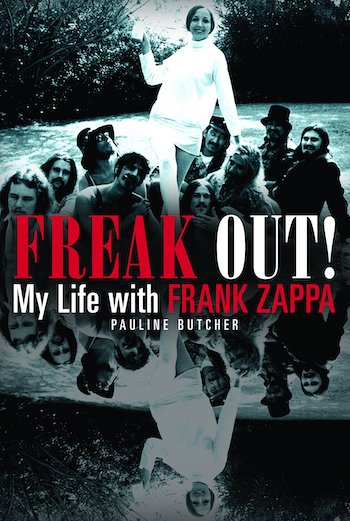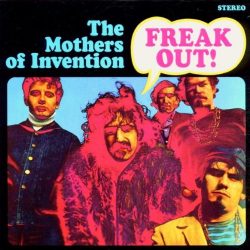Book Review: “Freak Out! My Life with the Mothers of Invention” — Intimate Observations
By Chelsea Spear
Fans of Frank Zappa who want to know about Frank the man as well as Zappa the musical and political icon would be wise to seek out Freak Out!
Freak Out! My Life with the Mothers of Invention by Pauline Butcher. W.F. Howes Limited, 14 hours 9 minutes, $22.

The seeds for Freak Out! My Life with the Mothers of Invention were planted in Pauline Butcher’s letters to her family during her four-year tenure as Frank Zappa’s personal assistant. After conceiving of it as a BBC miniseries, the story was published as a book in 2011 and was later adapted into the audio drama “Frank Zappa and Me.” After the release of Alex Winter’s masterful documentary Zappa, the book has been republished as an audiobook, giving audiences another opportunity to catch up with Butcher’s intimate observations of the mercurial composer, his legendary ’60s band, and his family.
In the mid-’60s, Pauline Butcher was cobbling together a living by teaching modeling and working as a typist for a temp firm in London. A chance assignment led her to Frank Zappa’s hotel suite, where the prim secretary was asked to transcribe the lyrics to songs like “Call Any Vegetable” and “Brown Shoes Don’t Make It.” She’s charmed by Zappa, but unimpressed by his nascent renown in Swinging London as a musician’s musician. Her willingness to call Zappa out on his outrageous lyrics makes an impression on the composer. Inspired, or perhaps concerned, by Butcher’s observations about his songs, Zappa dictates a series of explanations for his lyrics: “’Brown Shoes Don’t Make It’ is a song about the unfortunate people who manufacture inequitable laws and ordinances, perhaps unaware of the fact that the restrictions they place on the young people in a society are the result of their own sexual frustration. Dirty old men have no business running your country.” Smitten by Butcher’s chutzpah, Zappa hires her to help him work on a book about politics that he’d been assigned to write. She crosses the Atlantic and takes up residence with Zappa, his wife Gail, and their infant daughter Moon Unit at the legendary Log Cabin, where she answers fan mail, acts as a liaison between Zappa and his management, organizes recording sessions, and supervises the groupie band Girls Together Outrageously that Zappa has assembled — everything except work on the book.
The time frame for Freak Out! coincides with the later seasons of Mad Men, and there are some parallels between Butcher’s story and that of advertising ingenue Peggy Olson. Butcher depicts herself as plucky, confident, and hard-working, if somewhat naive about the world she’s entered. As with its mainstream East Coast counterpart, what we call sexual harassment is standard operating procedure in the Laurel Canyon counterculture. Pauline’s disinterest in sex with Frank or any members of his band, The Mothers of Invention, marks her as an easy target among the denizens of the Log Cabin. Butcher writes about Zappa’s attempts to seduce her in business meetings, starting with a tickle fight in one of their first confabulations as boss and employee, about Frank spanking her at her birthday party, and about receiving a pair of red crotchless panties as a Christmas gift from Frank and Gail. These stories reach their nadir when Pauline is summoned to a meeting with the Mothers. Expecting a list of tasks to prepare for an upcoming tour or recording session, Pauline is instead faced with Frank and the Mothers speculating about her nonexistent sex life. When she protests that one-night stands are “not my scene,” Frank counters: “We’ve been discussing it, Pauline, and we think that’s exactly what you do need.” In relating these anecdotes, Butcher’s breezy writing style and narrator Emma Gregory’s clipped accent balance good humor and slight revulsion. Still, in this post–Me Too era, these stories reflect an abuse of power that society still hasn’t come to terms with.
Like her Mad Men counterpart, Pauline slowly develops an interest in the burgeoning feminist movement, an interest she attempts to discuss with Frank. Though Zappa’s left-libertarian views were seen as progressive among ’60s antiwar liberals, his patriarchal views inevitably clash with Butcher’s. In a well-observed passage, Pauline tries to discuss women’s liberation with Frank as Gail cuts his hair, only for him to shut down Pauline’s observations and beliefs with poor-faith assumptions that run counter to his reputation as a thoughtful political intellect and master debater. When Pauline explains that feminists want equality in the workplace and an opportunity to be taken seriously, he dismisses it as “these dykes … want equality with men so it gives ’em an excuse to ball other women.”
 Butcher and Zappa are frequently at odds. For example, her naiveté about drug culture occasionally undermines her employer, most notably in an incident with the GTOs where a production assistant at a TV station catches one of the members snorting cocaine. Yet an undercurrent of mutual respect pulses through their work together. Frank frequently encourages Pauline to write about her time in the Log Cabin, and when her submission to Life magazine is rejected, he tells her to keep sending it out until it finds a home. Similarly, when Butcher sees a promising narrative in the groupie diaries Zappa has her transcribe, he supports her decision to edit and fact-check them and even inspires her to make herself a character in the stories.
Butcher and Zappa are frequently at odds. For example, her naiveté about drug culture occasionally undermines her employer, most notably in an incident with the GTOs where a production assistant at a TV station catches one of the members snorting cocaine. Yet an undercurrent of mutual respect pulses through their work together. Frank frequently encourages Pauline to write about her time in the Log Cabin, and when her submission to Life magazine is rejected, he tells her to keep sending it out until it finds a home. Similarly, when Butcher sees a promising narrative in the groupie diaries Zappa has her transcribe, he supports her decision to edit and fact-check them and even inspires her to make herself a character in the stories.
Emma Gregory’s narration transforms Butcher’s prose into something resembling a one-woman show. Gregory’s chameleonic vocal style infuses vivid life into a large cast of characters; she nails Frank’s low-slung California drawl, Gail’s swooping, flute-like sweetness (which is frequently at odds with her abrasive interpersonal style), and Mick Jagger’s lazily posh accent. Her ability to nail these and other big-name characters lends a credibility to the lesser-known figures who populate the story. Gregory’s narration is also attuned to Butcher’s ironic sense of humor: some of the passages that might read as starstruck are enlivened by a wry perspective on how ridiculous some of these events were.
Fans of Frank Zappa who want to know about Frank the man as well as Zappa the musical and political icon would be wise to seek out Freak Out! With its unforgettable ensemble cast and episodic structure, Butcher’s memoir would lend itself with ease to other media. Netflix, are you listening?
Chelsea Spear has written for the Brattle Theatre’s Film Notes blog, the Gay & Lesbian Review, and Crooked Marquee. She lives in Boston.
Tagged: Frank-Zappa, Freak Out! My Life with the Mothers of Invention

This sounds (literally) compelling. I’ve been plowing through audiobooks these days and prefer non-fiction to fiction on audio. This may be a good companion to some others I’ve finished up that document this same fertile period of time. Zappa was a dark character as many geniuses are. As an impressionable lad, I used to see them perform at the Garrick Theater in the Village in around 1966. Could that really be 55 years ago?